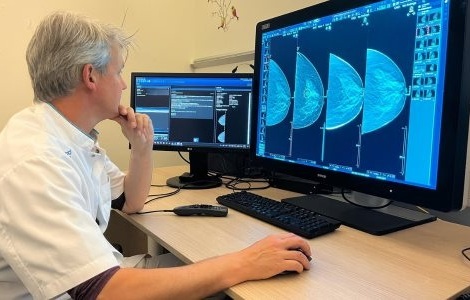Artificial Intelligence Predicts Treatment Success for Melanoma Patients from Early CT Scans
|
By MedImaging International staff writers Posted on 08 Mar 2022 |

Artificial intelligence (AI) is poised to revolutionize the field of radiology as a tool to improve disease detection, diagnosis, and clinical care. The technology has the potential to assist clinicians by uncovering hidden information within imaging scans invisible to even the well-trained eye. Now, researchers have demonstrated that applying AI to standard-of-care imaging can help predict how well immunotherapy will work for patients with melanoma.
Researchers at Columbia University (New York, NY, USA) have developed a machine learning algorithm that analyzes a patient’s computed tomography (CT) scans and creates a biomarker – known as a radiomic signature – that correlates with patient outcome. The signature used specific features of the tumor to determine with high accuracy whether a given individual’s disease would respond well to immunotherapy, remain stable, or continue to progress. The goal of immunotherapy, which has become a primary treatment for melanoma, is to stimulate a patient’s own immune system to fight cancer.
Currently, clinicians rely almost entirely on tumor size to estimate the benefit of a therapy. Patients receive a baseline CT scan and then subsequent follow-up scans after treatment has begun. If the tumor shrinks, the treatment seems to be working, while growth implies that the patient’s disease is getting worse. But this is not necessarily the case with immunotherapy, and studies have shown that tumor size and growth does not always correlate with overall survival.
Biologically, tumors may evolve throughout the course of a patient’s disease in ways that are more complex than a measure of size alone can reflect. As an example of this, the researchers found that their machine learning algorithm worked best when it took not only tumor volume and growth into account, but also tumor spatial heterogeneity, or the non-uniform distribution of cancer cells across disease sites, and texture, which looks at the variation of pixel intensities across the tumor CT image.
The researchers validated the algorithm on data from 287 patients with advanced melanoma who were administered the immunotherapy drug pembrolizumab. The radiomic signature, which used CT images obtained at baseline and three-month follow-up was able to estimate overall survival at six months with a high degree of accuracy. In fact, it outperformed the standard method based on tumor diameter, known as Response Evaluation Criteria in Solid Tumors 1.1 (RECIST 1.1), which is commonly used in clinical trials to assess treatment efficacy.
The researchers now aim to expand the project to a variety of different tumor types - such as lung cancer, colon cancer, renal cancer, and prostate cancer - as well as other treatments beyond immunotherapy. The researchers wanted to start with a novel therapy and chose melanoma because of the recent, rapid adoption of immunotherapy for the disease.
“We hope to take a patient early on who looks like they are not doing well on a given therapy because of their signature and enhance, change, or add another drug to the therapy,” said Lawrence H. Schwartz, MD, the James Picker Professor and chair of the Department of Radiology at Columbia University Vagelos College of Physicians and Surgeons (VP&S).
“The field of radiology and imaging in general has never been more exciting with this artificial intelligence revolution,” added Dr. Schwartz. “We’ve always looked at advances in terms of new machines, new tracers, and things like this. But this gives us an opportunity to optimize the information that we have from all of our imaging modalities to speed diagnosis, to become more accurate and precise, and give patients more effective treatments.”
Related Links:
Columbia University
Latest General/Advanced Imaging News
- 3D Scanning Approach Enables Ultra-Precise Brain Surgery
- AI Tool Improves Medical Imaging Process by 90%
- New Ultrasmall, Light-Sensitive Nanoparticles Could Serve as Contrast Agents
- AI Algorithm Accurately Predicts Pancreatic Cancer Metastasis Using Routine CT Images
- Cutting-Edge Angio-CT Solution Offers New Therapeutic Possibilities
- Extending CT Imaging Detects Hidden Blood Clots in Stroke Patients
- Groundbreaking AI Model Accurately Segments Liver Tumors from CT Scans
- New CT-Based Indicator Helps Predict Life-Threatening Postpartum Bleeding Cases
- CT Colonography Beats Stool DNA Testing for Colon Cancer Screening
- First-Of-Its-Kind Wearable Device Offers Revolutionary Alternative to CT Scans
- AI-Based CT Scan Analysis Predicts Early-Stage Kidney Damage Due to Cancer Treatments
- CT-Based Deep Learning-Driven Tool to Enhance Liver Cancer Diagnosis
- AI-Powered Imaging System Improves Lung Cancer Diagnosis
- AI Model Significantly Enhances Low-Dose CT Capabilities
- Ultra-Low Dose CT Aids Pneumonia Diagnosis in Immunocompromised Patients
- AI Reduces CT Lung Cancer Screening Workload by Almost 80%
Channels
Radiography
view channel
X-Ray Breakthrough Captures Three Image-Contrast Types in Single Shot
Detecting early-stage cancer or subtle changes deep inside tissues has long challenged conventional X-ray systems, which rely only on how structures absorb radiation. This limitation keeps many microstructural... Read more
AI Generates Future Knee X-Rays to Predict Osteoarthritis Progression Risk
Osteoarthritis, a degenerative joint disease affecting over 500 million people worldwide, is the leading cause of disability among older adults. Current diagnostic tools allow doctors to assess damage... Read moreMRI
view channel
Novel Imaging Approach to Improve Treatment for Spinal Cord Injuries
Vascular dysfunction in the spinal cord contributes to multiple neurological conditions, including traumatic injuries and degenerative cervical myelopathy, where reduced blood flow can lead to progressive... Read more
AI-Assisted Model Enhances MRI Heart Scans
A cardiac MRI can reveal critical information about the heart’s function and any abnormalities, but traditional scans take 30 to 90 minutes and often suffer from poor image quality due to patient movement.... Read more
AI Model Outperforms Doctors at Identifying Patients Most At-Risk of Cardiac Arrest
Hypertrophic cardiomyopathy is one of the most common inherited heart conditions and a leading cause of sudden cardiac death in young individuals and athletes. While many patients live normal lives, some... Read moreUltrasound
view channel
Wearable Ultrasound Imaging System to Enable Real-Time Disease Monitoring
Chronic conditions such as hypertension and heart failure require close monitoring, yet today’s ultrasound imaging is largely confined to hospitals and short, episodic scans. This reactive model limits... Read more
Ultrasound Technique Visualizes Deep Blood Vessels in 3D Without Contrast Agents
Producing clear 3D images of deep blood vessels has long been difficult without relying on contrast agents, CT scans, or MRI. Standard ultrasound typically provides only 2D cross-sections, limiting clinicians’... Read moreNuclear Medicine
view channel
PET Imaging of Inflammation Predicts Recovery and Guides Therapy After Heart Attack
Acute myocardial infarction can trigger lasting heart damage, yet clinicians still lack reliable tools to identify which patients will regain function and which may develop heart failure.... Read more
Radiotheranostic Approach Detects, Kills and Reprograms Aggressive Cancers
Aggressive cancers such as osteosarcoma and glioblastoma often resist standard therapies, thrive in hostile tumor environments, and recur despite surgery, radiation, or chemotherapy. These tumors also... Read more
New Imaging Solution Improves Survival for Patients with Recurring Prostate Cancer
Detecting recurrent prostate cancer remains one of the most difficult challenges in oncology, as standard imaging methods such as bone scans and CT scans often fail to accurately locate small or early-stage tumors.... Read moreImaging IT
view channel
New Google Cloud Medical Imaging Suite Makes Imaging Healthcare Data More Accessible
Medical imaging is a critical tool used to diagnose patients, and there are billions of medical images scanned globally each year. Imaging data accounts for about 90% of all healthcare data1 and, until... Read more
Global AI in Medical Diagnostics Market to Be Driven by Demand for Image Recognition in Radiology
The global artificial intelligence (AI) in medical diagnostics market is expanding with early disease detection being one of its key applications and image recognition becoming a compelling consumer proposition... Read moreIndustry News
view channel
GE HealthCare and NVIDIA Collaboration to Reimagine Diagnostic Imaging
GE HealthCare (Chicago, IL, USA) has entered into a collaboration with NVIDIA (Santa Clara, CA, USA), expanding the existing relationship between the two companies to focus on pioneering innovation in... Read more
Patient-Specific 3D-Printed Phantoms Transform CT Imaging
New research has highlighted how anatomically precise, patient-specific 3D-printed phantoms are proving to be scalable, cost-effective, and efficient tools in the development of new CT scan algorithms... Read more
Siemens and Sectra Collaborate on Enhancing Radiology Workflows
Siemens Healthineers (Forchheim, Germany) and Sectra (Linköping, Sweden) have entered into a collaboration aimed at enhancing radiologists' diagnostic capabilities and, in turn, improving patient care... Read more



















